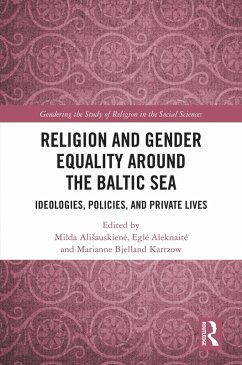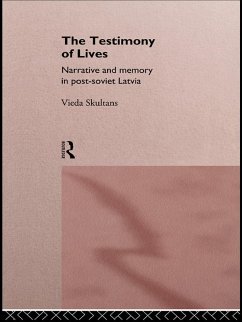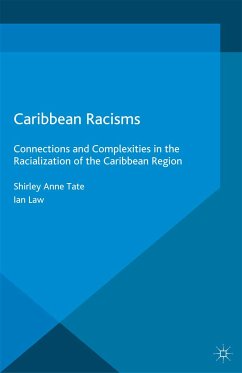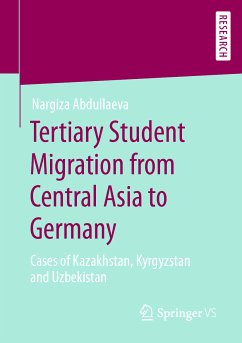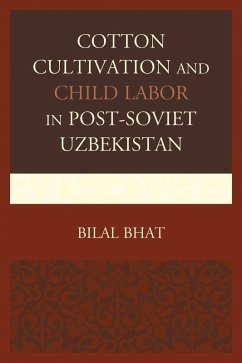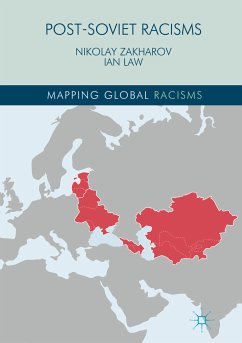
Post-Soviet Racisms (eBook, PDF)
Versandkostenfrei!
Sofort per Download lieferbar
72,95 €
inkl. MwSt.
Weitere Ausgaben:

PAYBACK Punkte
36 °P sammeln!
This book is novel not only in its theoretical framework, which places racialisation in post-communist societies and their modernist political projects at the centre of processes of global racism, but also in being the first account to examine both these new national contexts and the interconnections between racisms in these four regions of the Baltic states, the Southern Caucasus, Central Asia and Belarus, Moldova and Ukraine, and elsewhere. Assessments of the significance of the contemporary geopolitical contexts of armed conflict, economic transformation and political transition for racial ...
This book is novel not only in its theoretical framework, which places racialisation in post-communist societies and their modernist political projects at the centre of processes of global racism, but also in being the first account to examine both these new national contexts and the interconnections between racisms in these four regions of the Baltic states, the Southern Caucasus, Central Asia and Belarus, Moldova and Ukraine, and elsewhere. Assessments of the significance of the contemporary geopolitical contexts of armed conflict, economic transformation and political transition for racial discourse are central themes, and the book highlights the creative, innovative and persistent power of contemporary forms of racial governance which has central significance for understanding contemporary societies.
The book will be of interest to scholars and students in the areas of racism and ethnicity studies.
"What an important and much-needed addition to the growing,but still grossly insufficient, body of work on Soviet racial thinking and its impact on Soviet and post-Soviet racisms. At the time of renewed racial tensions in the West and the growing racial anxieties underlying a variety of nation-building projects in the former Soviet spaces it is important to understand the often ignored linkages between Communist paternalism and Western views of race and racial difference. Even though its focus remains the former Soviet Union this book contains a valuable analytical toolkit for the scholars of race and racism across political and geographical boundaries."
-Maxim Matusevich, Seton Hall University, USA
"Post-Soviet Racisms is the first comprehensive comparative study of the politics of race in post-Soviet states. Why do racialising or overtly racist theories at times become central to the construction of post-Soviet identities? How do racisms of the dominant national groups and minorities compare? How does the process of the transnational circulation of racist and racialising discourses work? These are some of the important questions which are addressed in this ground-breaking book that enriches our understanding of the complexity of the current developments in the region."
-Vera Tolz, University of Manchester, UK
The book will be of interest to scholars and students in the areas of racism and ethnicity studies.
"What an important and much-needed addition to the growing,but still grossly insufficient, body of work on Soviet racial thinking and its impact on Soviet and post-Soviet racisms. At the time of renewed racial tensions in the West and the growing racial anxieties underlying a variety of nation-building projects in the former Soviet spaces it is important to understand the often ignored linkages between Communist paternalism and Western views of race and racial difference. Even though its focus remains the former Soviet Union this book contains a valuable analytical toolkit for the scholars of race and racism across political and geographical boundaries."
-Maxim Matusevich, Seton Hall University, USA
"Post-Soviet Racisms is the first comprehensive comparative study of the politics of race in post-Soviet states. Why do racialising or overtly racist theories at times become central to the construction of post-Soviet identities? How do racisms of the dominant national groups and minorities compare? How does the process of the transnational circulation of racist and racialising discourses work? These are some of the important questions which are addressed in this ground-breaking book that enriches our understanding of the complexity of the current developments in the region."
-Vera Tolz, University of Manchester, UK
Dieser Download kann aus rechtlichen Gründen nur mit Rechnungsadresse in A, B, BG, CY, CZ, D, DK, EW, E, FIN, F, GR, HR, H, IRL, I, LT, L, LR, M, NL, PL, P, R, S, SLO, SK ausgeliefert werden.



